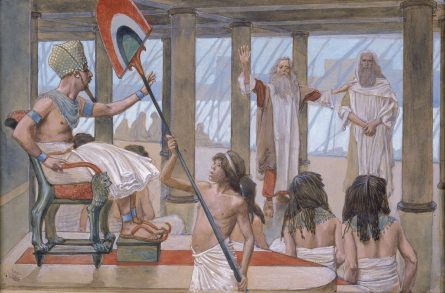Lee Woofenden has an excellent post today on the question of whether God hardens anyone’s heart, and whether we can be held responsible if He does. Lee outlines his answer:
1. The Bible often speaks according to the human appearance rather than the divine reality.
2. This is necessary for the Bible to achieve God’s purpose for it: to save our eternal souls.
3. God will not allow us to achieve enlightenment that we are unable to sustain.
4. God’s love and mercy is turned into its opposite in people who are opposed to God.
Lee starts by tackling the most well-known Biblical examples of God apparently hardening people’s hearts: the account from Exodus of Pharaoh’s heart being hardened against releasing the Children of Israel, and Paul’s reference to this in Romans 9. Lee again:
Paul refers to the example of Pharaoh:
The Lord said to Moses, “When you return to Egypt, see that you perform before Pharaoh all the wonders I have given you the power to do. But I will harden his heart so that he will not let the people go.” (Exodus 4:21)
There you have it! It’s God’s fault that Pharaoh wouldn’t let the people of Israel go! It’s God’s fault that the Egyptians had to suffer all those plagues!
But even in the story itself, covering Exodus chapters 4 to 14, there are hints that it’s not quite so simple. Yes, ten times it says that the Lord hardened the hearts of Pharaoh and his officials. But seven times it says that Pharaoh and his officials hardened their hearts. So who did the hardening, God or Pharaoh?
Expanding on the first point in his outline quoted above, Lee suggests that the entire Bible is written in accommodation to the receptibility of its hearers and readers:
When God spoke to the people of Bible times, God not only had to speak in their particular language, but also in the concepts they knew about and believed. There was only so much God could say without completely losing his audience.
In the New Testament, Jesus was well aware of the limitations on what he could say even to his closest disciples. That’s why he said to them, “I still have many things to say to you, but you cannot bear them now” (John 16:12). He could tell them only as much as their minds (and hearts) were capable of grasping at that time.
I think this principle is even clearer in Jesus’ words on divorce: “Moses, because of the hardness of your hearts, permitted you to divorce your wives, but from the beginning it was not so” (Matthew 19:8).
I encourage you to read the whole article to see how Lee expands on the other points.
As it happens, I read these chapters in Exodus just a few weeks ago, and I’d already been thinking about how God could be said to harden Pharaoh’s heart when I read Lee’s post. In particular, I’ve been reflecting on the principle Lee expounds in his fourth part: “God’s love and mercy is turned into its opposite in people who are opposed to God.”
This is the sense in which I think God really could be said to have caused the hardening of Pharaoh’s heart, even though I think it’s clear from other passages in Scripture that God never causes evil. What can lead to a hardened heart is a closer presence of God, which forces a decision one way or another – do I change, or do I double-down on where I already am?
I see something like this with my kids. Sometimes my kids get upset when they can’t have something they want. When that happens, I frequently offer them an alternative. More often than not, they reject the alternative (and it occasionally ends up hurled across the room). Giving them the choice ends up hardening them against whatever is being offered. But there are times when they do take the alternative, and even more times when they grudgingly accept it later after first firmly rejecting it. Giving them that choice, I think, is still an act of love.
I see the same thing in myself. If I’m in a bad mood and my wife gently suggests doing something that will bring me out of it, I sometimes react by retreating even more thoroughly into my grumpiness. I could blame Anne for hardening my heart – if she hadn’t said anything, I wouldn’t have gotten defensive about that bad mood. But the reality is, I’ve hardened myself in response to her loving suggestion.
I think that’s the dynamic at work in the story of Pharaoh. God draws closer and it dawns on Pharaoh that he could let the people of Israel go, he could do the right thing. And he almost does. But the full realization of what that will mean snaps him back to his earlier reluctance, which he then clings to even more zealously. Has God hardened his heart? Sort of. But only in the sense that He opened Pharaoh’s eyes a bit, and He knew that Pharaoh would respond by hardening his own heart against God’s loving offer.
(Image by James Tissot – http://www.thejewishmuseum.org/onlinecollection/object_collection.php?objectid=26342&artistlist=1&an=James Jacques Joseph Tissot, Public Domain, Link)













